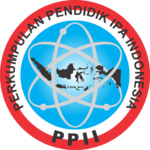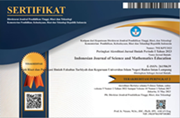Enhancing mathematical proof skills in teacher education through etymology-based learning approaches
Abstract
Keywords
Full Text:
PDFReferences
Y.-J. Lan, K.-E. Chang, and N.-S. Chen, “CoCAR: An online synchronous training model for empowering ICT capacity of teachers of Chinese as a foreign language,” Australas. J. Educ. Technol., vol. 28, no. 6, pp. 1021-1038, 2012, doi : 10.14742/ajet.808.
G. C. Leder, “Research in mathematics education–constraints on construction,” in Challenges in mathematics education: Constraints on construction. Proceedings of the 17th Annual Conference of the Mathematics Education Research Group of Australasia, 1994, pp. 31–48.
T. J. Cooney, “A beginning teacher’s view of problem solving,” J. Res. Math. Educ., vol. 16, no. 5, pp. 324–336, 1985.
M. Rif’at, “The exploring of visual imagery: In their relation to the students’ mathematical identity,” High. Educ. Res., vol. 5, no. 75, pp. 75–91, 2018, doi : 10.11648/j.her.20180305.11.
J. Mason, L. Burton, and K. Stacey, Thinking Mathematically. Pearson : England, 2010.
M. Ayalon and R. Even, “Mathematics educators’views on the role of mathematics learning in developing deductive reasoning,” Int. J. Sci. Math. Educ., vol. 8, no. 6, pp. 1131–1154, 2010, doi : 10.1007/s10763-010-9238-z.
E. Salsabila, W. Rahayu, and P. D. Sampoerno, “Performance assessment to measure student’s mathematical proving ability based on the abductive-deductive approach,” in KnE Soc. Sci., 2020, pp. 343–354, doi : 10.18502/kss.v4i14.7892.
E. Pehkonen, “Finnish elementary teachers’ conceptions on problem solving in mathematics teaching,” La Mat. e la sua Didatt., vol. 25, no. 1, pp. 13–27, 2017.
H. Wu, “Basic skills versus conceptual understanding,” Am. Educ., vol. 23, no. 3, pp. 14–19, 1999.
D. Loewenberg Ball, M. H. Thames, and G. Phelps, “Content knowledge for teaching: What makes it special?,” J. Teach. Educ., vol. 59, no. 5, pp. 389–407, 2008.
I. M. Gomez-Chacon, “Affective influences in the knowledge of mathematics,” Educ. Stud. Math., vol. 43, no. 2, pp. 149–168, 2000.
R. Junco and S. R. Cotten, “No A 4 U: The relationship between multitasking and academic performance,” Comput. Educ., vol. 59, no. 2, pp. 505–514, 2012.
J. P. Byrnes and D. C. Miller, “The relative importance of predictors of mathematics and science achievement: An opportunity–propensity analysis,” Contemp. Educ. Psychol., vol. 32, no. 4, pp. 599–629, 2007.
M.-S. Chiu, “Differential psychological processes underlying the skill-development model and self-enhancement model across mathematics and science in 28 countries,” Int. J. Sci. Math. Educ., vol. 10, pp. 611–642, 2012.
M.-S. Chiu and D. Whitebread, “Taiwanese teachers’ implementation of a new ‘constructivist mathematics curriculum’: How cognitive and affective issues are addressed,” Int. J. Educ. Dev., vol. 31, no. 2, pp. 196–206, 2011.
G. Hanna and C. Knipping, “Mathematical proof in mathematics education, 1980-2020: An overview,” vol. 1, no. 1, pp. 1-13, 2020.
A. M. Raymond and M. Leinenbach, “Collaborative action research on the learning and teaching of algebra: a story of one mathematics teacher’s development,” Educ. Stud. Math., vol. 41, no. 3, pp. 283–307, 2000.
S. Mathieson, “Integrating research, teaching and practice in the context of new institutional policies: A social practice approach,” Higher Education, vol. 78, no.5, pp. 799-815, 2019, doi : 10.1007/s10734-019-00371-x.
E. Surya and F. A. Putri, “Improving mathematical problem-solving ability and self-confidence of high school students through contextual learning model.,” J. Math. Educ., vol. 8, no. 1, pp. 85–94, 2017.
H. Rocha, “Mathematical proof: From mathematics to school mathematics,” Philos. Trans. R. Soc. A, vol. 377, no. 2140, pp. 1-12, 2019.
D. S. Dickerson and H. M. Doerr, “High school mathematics teachers’ perspectives on the purposes of mathematical proof in school mathematics,” Math. Educ. Res. J., vol. 26, no. 1, pp. 711–733, 2014.
H. Bass, “Mathematical proof in mathematics education: An endangered species? A review of teaching and learning mathematical proof across the grades: AK–16 perspective,” J. Res. Math. Educ., vol. 42, no. 1, pp. 98–103, 2011.
J. Vanhalst, L. Goossens, K. Luyckx, R. H. J. Scholte, and R. C. M. E. Engels, “The development of loneliness from mid-to late adolescence: Trajectory classes, personality traits, and psychosocial functioning,” J. Adolesc., vol. 36, no. 6, pp. 1305–1312, 2013.
R. Benson and C. Brack, “Developing the scholarship of teaching: what is the role of e-teaching and learning?,” Teach. High. Educ., vol. 14, no. 1, pp. 71–80, 2009.
M.-S. Chiu, “An ecological approach to adolescent mathematics ability development: Differences in demographics, parenting, mathematics teaching, and student behaviors and emotions,” Educ. Stud., vol. 47, no. 2, pp. 155–178, 2021.
D. B. McLeod, “Research on affect and mathematics learning in the JRME: 1970 to the present,” J. Res. Math. Educ., vol. 25, no. 6, pp. 637–647, 1994.
F. Peixoto, C. Sanches, L. Mata, and V. Monteiro, "How do you feel about math?’: Relationships between competence and value appraisals, achievement emotions and academic achievement,” Eur. J. Psychol. Educ., vol. 32, no. 3, pp. 385–405, 2017, doi : 10.1007/s10212-016-0299-4.
W. Ahmed, G. Van der Werf, H. Kuyper, and A. Minnaert, “Emotions, self-regulated learning, and achievement in mathematics: A growth curve analysis.,” J. Educ. Psychol., vol. 105, no. 1, pp. 150-161, 2013, doi : 10.1037/a0030160.
M. M. Bleeker and J. E. Jacobs, “Achievement in mathematics and science: Do mothers’ beliefs matter 12 years later?,” J. Educ. Psychol., vol. 96, no. 1, pp. 97-109, 2004, doi : 10.1037/0022-0663.96.1.97.
P. Vankúš, “Influence of game-based learning in mathematics education on students’ affective domain: A systematic review,” Mathematics, vol. 9, no. 9, pp. 1-10, 2021, doi: 10.3390/math9090986.
DOI: http://dx.doi.org/10.24042/ijsme.v7i2.22894
Refbacks
- There are currently no refbacks.
Copyright (c) 2024 Unit Riset dan Publikasi Ilmiah FTK UIN Raden Intan Lampung

This work is licensed under a Creative Commons Attribution-ShareAlike 4.0 International License.

Indonesian Journal of Science and Mathematics Education is licensed under a Creative Commons Attribution-ShareAlike 4.0 International License.




